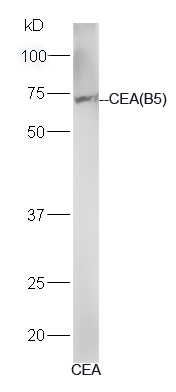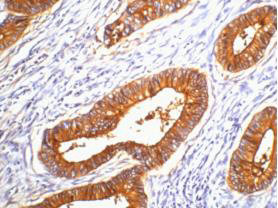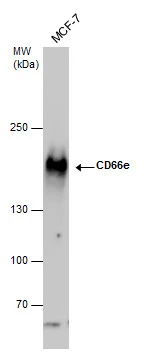Mouse anti Carcinoembryonic Antigen / CEA
MUB0332P
ApplicationsFlow Cytometry, Western Blot, ImmunoCytoChemistry, ImmunoHistoChemistry, ImmunoHistoChemistry Frozen, ImmunoHistoChemistry Paraffin
Product group Antibodies
ReactivityHuman
TargetCEACAM5
Overview
- SupplierNordic-MUbio
- Product NameMouse anti Carcinoembryonic Antigen / CEA
- Delivery Days Customer7
- Application Supplier NotePARLAM 4 is useful for flow cytometry, immunoblotting, immunocytochemistry on methanol fixed cells and immunohistochemistry on frozen tissues when using a PBS buffer containing 0.1 mM CaCl2 and 0.1 mM MgCl2. The antibody is also reactive in formalin-fixed and paraffin-embedded tissue sections after treatment with citrate buffer pH 6.0 in an autoclave. Human colon carcinoma tissue is used as positive control. Optimal antibody dilution should be determined by titration; we recommend a 1:25 - 1:100 dilution for immunohistochemistry with avidin-biotinylated Horseradish peroxidase complex (ABC) as detection reagent, and 1:100 - 1:500 for immunoblotting application.
- ApplicationsFlow Cytometry, Western Blot, ImmunoCytoChemistry, ImmunoHistoChemistry, ImmunoHistoChemistry Frozen, ImmunoHistoChemistry Paraffin
- Applications SupplierFlow Cytometry;Immunocytochemistry;Immunohistochemistry (frozen);Immunohistochemistry (paraffin);Western Blotting
- CertificationResearch Use Only
- ClonalityMonoclonal
- Clone IDPARLAM 4
- Gene ID1048
- Target nameCEACAM5
- Target descriptionCEA cell adhesion molecule 5
- Target synonymsCD66e, CEA, cell adhesion molecule CEACAM5, carcinoembryonic antigen related cell adhesion molecule 5, meconium antigen 100
- HostMouse
- IsotypeIgG1
- Protein IDP06731
- Protein NameCell adhesion molecule CEACAM5
- SourcePARLAM 4 is a mouse monoclonal IgG1 antibody derived by fusion of Sp 2/0 Ag 14 Mouse myeloma cells with spleen cells from a BABL/c Mouse immunized with isolated Human CEA. The immunogen has been isolated from Human colonic carcinoma cells.
- ReactivityHuman
- Reactivity SupplierHuman
- UNSPSC12352203








